Written by: Kim Hansen
If you’re reading this, you’re probably a person used to having to climb mountains to get through life. Maybe you are also a domestic violence survivor, someone who experienced childhood trauma, or you know someone who has survived these challenges.
Let me just say: I am with you.
It has been my lifelong experience that overcoming abuse and trauma is like climbing a mountain in that both require immense strength, resilience, and perseverance.
Each step forward is a triumph over adversity. There are often unexpected setbacks and moments that require rest before taking the next step forward, but each step forward is a triumph over adversity, providing new and beautiful perspectives.
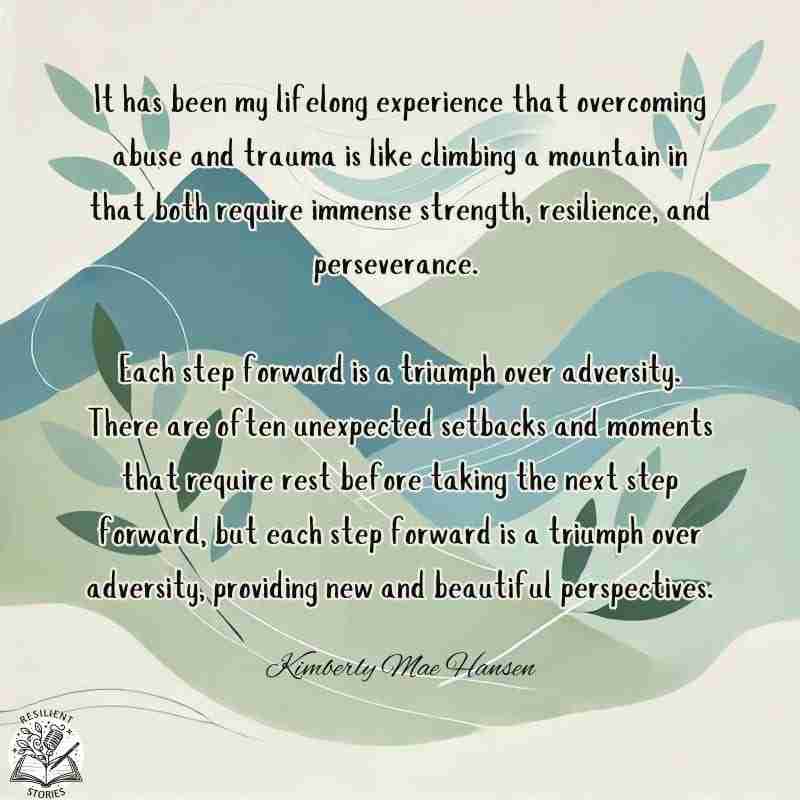
Ultimately, reaching the summit symbolizes overcoming significant challenges and finding a sense of empowerment and accomplishment.
A Little Background on Me
I have lived in Montana for almost 30 years, but I started my life in Ohio. I was born the second child to a very young mother.
She was an abusive drug addict who suffered from severe mental illness, moved us frequently, beat and tortured us physically and psychologically, and withheld food and love.
I share this to help others realize that if we are not shown healthy love with healthy boundaries early in life, we will continue to engage in relationships with people who show love in unhealthy ways and have unhealthy boundaries.
It’s been my experience that unhealthy love plus unhealthy boundaries equals disaster.
When someone recently asked me to explain my childhood in one word, I said, “Afghanistan.” It truly was like a war zone inside my home. There was no such thing as feeling safe. I knew I had to get out.
At 19, I moved across the country to escape my mother’s torment. I spent the next five years carving my own path in the wide, open spaces of Montana, where I instantly fell in love with the mountains.
My sister thought I was running away from home, but I think I was running toward the freedom, strength, courage, and independence that the mountains represented for me.
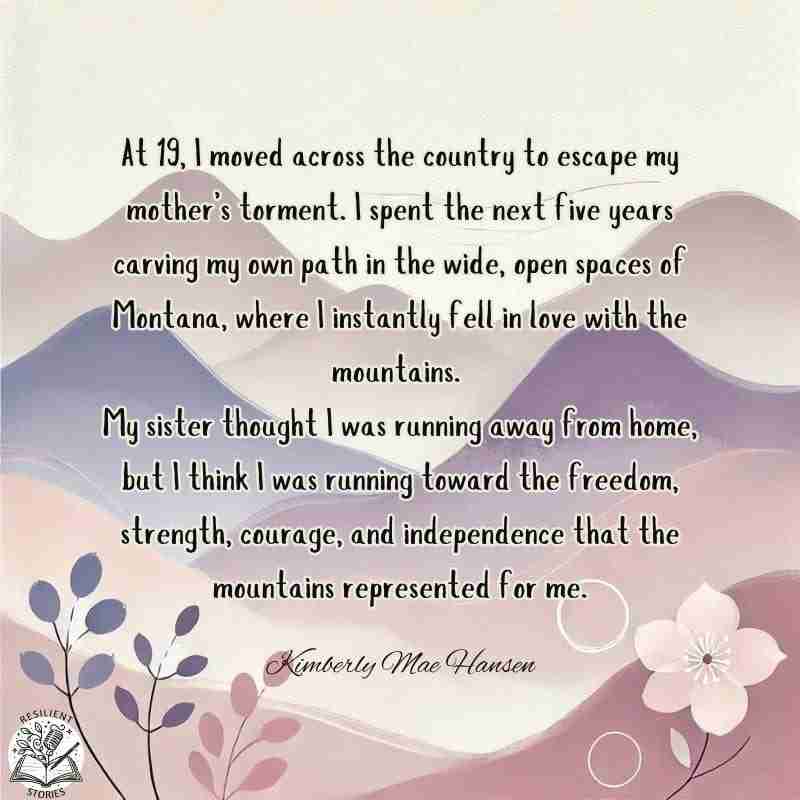
At 24 years old, I found myself in an abusive relationship with a man who was cheating on me and denying it, gaslighting me, and accusing me of being crazy.
My mother had just died of a drug overdose (on Mother’s Day!), and I was six weeks from returning to college after being medically discharged from the Army National Guard with a chronic autoimmune disorder.
My life was in shambles…and I kept a journal during this time.
Journal Entries of a Survivor of Domestic Violence:
It is with great vulnerability that I share some of those entries with you now to illustrate a few key points about recovering after trauma and being physically abused.
Entry 1: How My Violent Relationship Began and Ended
June 13, 2001
Twenty-four hours after my last entry, Jason and I got into an argument, and he subjected me to severe physical abuse. I’ve never, as an adult, been in a physical altercation. Jason has never touched me like that before.
To be wrestled with, punched full-force in the face, dragged across the front porch by a man who was a foot taller and weighed twice as much. God, I thought he was going to kill me. I think if he had gotten me into the basement like he wanted, he would have beaten me to death.
The only reason he didn’t get me into the basement was because of my screaming. The cops who finally arrived told me that the MSU- Billings Campus Police heard my screams from 2.5 miles away and called the city police.
The campus and city police swarmed the front yard together, six cars shining all six sets of police car headlights on us. Jason didn’t skip a beat. He stood me up, dusted me off, straightened out my shirt, spun me toward the headlights, and put his arm around me like we were posing for a picture.
I was in shock. Stunned. Frozen.
How could he do that after he just beat the shit out of me? He told me to smile and tell them everything was fine. It was like I was a trophy trout, and he was holding me up for a picture, and he was so proud.
The thought of it makes me sick. He shouted across the yard, “We’re good. We’re fine.”
A cop said, “She doesn’t look fine. Ma’am, are you okay?” There was no voice left in me. I had screamed every last breath out of myself.
All I could do was stream tears and shake my head. No. I am not okay. I don’t think I’ve ever been so afraid in my life.
Why did he do that? Why couldn’t he just leave me alone? I am so angry that someone had the capability to scare me so much. To make me think my life might end. Why did he think it was okay to do that to me?
At work, I can’t concentrate. My mind replays him punching me, not letting go of me, him chasing me up the front porch steps, him trying to yank me away from the awning supports. I knew if I let go, I’d be dead.
I’ll never forget his mouth by my ear, whispering about how he wanted to “shut me up for good,” and I knew I had to fight for my life.
At night, I don’t sleep. I lay in bed listening to every creak and thud, wondering if it was Jason trying to find a way into my apartment. I can’t see out of my left eye. When he punched me, he tore my left cornea.
I get headaches and throw up at work when I try to cashier because my left eye won’t focus. It makes me feel like I constantly have motion sickness.
Every day I find a new bruise I didn’t know he gave me. I can’t stand to look in the mirror. I see my smashed and swollen face and bruised eye and think, he told me he loved me, and then he almost killed me.
Entry 2: The Lingering Pain of a Domestic Violence Survivor After an Abusive Relationship
Present-Day Reflection:
When this happened, I found myself noticing physical reminders of the abuse and also being haunted by memories of the past. My nervous system became very overwhelmed.
The aftermath of an abusive relationship can be overwhelming, bringing tears and emotional turmoil even in the simplest moments. As a domestic violence survivor, these memories and their impact can haunt everyday life.
The journal entry that follows shows ways that I was dealing with the trauma: writing, crying, kickboxing, and praying.
June 21, 2001
If only EVERYTHING didn’t bring me to tears! I cry to myself while I’m kickboxing, thinking about my ex-partner. Someone complimented my eyes, and they filled with tears. I have felt myself on the verge all day.
Today, I found myself thinking about the time I got out of the bathtub as Jason was walking in from work. He came into the bathroom and wrapped his arms around me.
Then, he kissed me and commented on how soft my skin was. He was so loving and gentle to me.
And then, on June 8, he almost killed me.
I think in patterns that end on that phrase, most all the time. I wish I could quit thinking that way
What a fucking bastard.
God, just help me fall asleep tonight.
I know I’m better off without him.
Entry 3: Reclaiming Control and Finding Courage After Domestic Abuse and Trauma
Present Day Reflection:
For domestic violence survivors, abuse and trauma survivors, and survivors of assault, small acts of bravery can represent significant progress in reclaiming control over their lives.
Each step, no matter how minor it may seem, is a victory over the fear instilled by their abuser.
06/30/01
Last night, I slept with two of my windows open—progress. Two nights ago, D and C slept over here because they were in the middle of moving and needed a place to crash.
I was so glad to have them here and to feel safe.
So I opened some windows. With them here, I didn’t have to wonder if Jason would try to climb through one of the windows to kill me.
Last night, though, when it was time for me to go to bed, I thought I should close them because I felt scared that Jason would climb in…
Then I thought, FUCK THAT! FUCK JASON! … But I still felt scared. So, I thought I’d compromise with myself. I’ll just close one window. But which one? The one in my room or the one in my kitchen?
Then I think again, FUCK JASON.
It’s not brave if you’re not scared. And I decided to leave them both open. So, today, I opened all of my windows. I don’t know if I can sleep like that, though. But I feel like, maybe, if I keep doing the things I’m afraid of, maybe I’ll become less petrified.
I am less terrified. Last night, I had to pull my car out of the street and into under the awning. It was midnight when I finally went out of my apartment to move it. The fear was paralyzing. I locked my door so Jason couldn’t sneak in while I was moving my car. I am nearly paranoid.
How do I rationalize the concept that he wouldn’t be trying to sneak into my apartment? I thought he’d never hit me, but he did. So, I can’t be rational about this. Instead, I try not to let the fear paralyze me. I complete the minuscule tasks that scare me.
I take the trash out, come home from work alone, go to the pool, walk through the mall parking lot alone, sleep with my windows open—or I did twice, anyway. When I can force myself to be brave enough, I may sit on my front porch.
After dark, I may go running. I am trying not to let him control my life or my actions. I am trying to be brave.
Present-Day Reflection:
As a person who has survived much, I often grapple with the lingering trauma and memories of my abusive situation.
Over the last two decades, I have used various therapy methodologies — reading, hiking, meditation, poetry, gardening, and journaling, to help me move through these things and step into healthier and happier ways of being in relationships with others.
Changing the Narrative: Reflecting on a Journey of Healing As a Domestic Violence Survivor
For people who have experienced domestic violence, abuse, and trauma, it is important to harness their strength and resilience in the journey toward healing.
Reflecting on the past and recognizing personal growth can be a powerful reminder of your inner strength and capability to overcome. In fact, if you did an audit, I bet you have a history of overcoming adversity—a history of victory!
Present Day Reflection:
When I was a child, I did not believe that anything other than a violent and abusive life was available to me. I carried that belief into early relationships and tolerated things I never should have tolerated.
But 23 years have come and gone since this horrific period of my life, and it hasn’t all been easy, but the good parts have been really good and worth every painful step I took to get there.
Since then, I have done things I never thought I could do. I earned two college degrees. I have two children, own a home, and have a mature, healthy relationship with a man who treats me with compassion, grace, and unconditional love, always.
Since 2012, I have owned a business consultant company and recently founded an inclusion-focused nonprofit. Having lived near the mountains for many years, I’ve become an avid hiker, literally hiking to the tops of mountains.
There’s a technique in mountaineering called the Rest Step. When the climb is long and steep, your thighs are burning, and your glutes are screaming, you Rest Step. You breathe. And rest on the downhill leg, then step up.
Then rest again. Then step up. You don’t move by momentum; you move with intention. Then rest.
Then you step. You rest. Then you step.
This is how people make it to the top of Mount Everest–with calculated movements partnered with tiny rests to conserve energy between challenging steps to a summit.
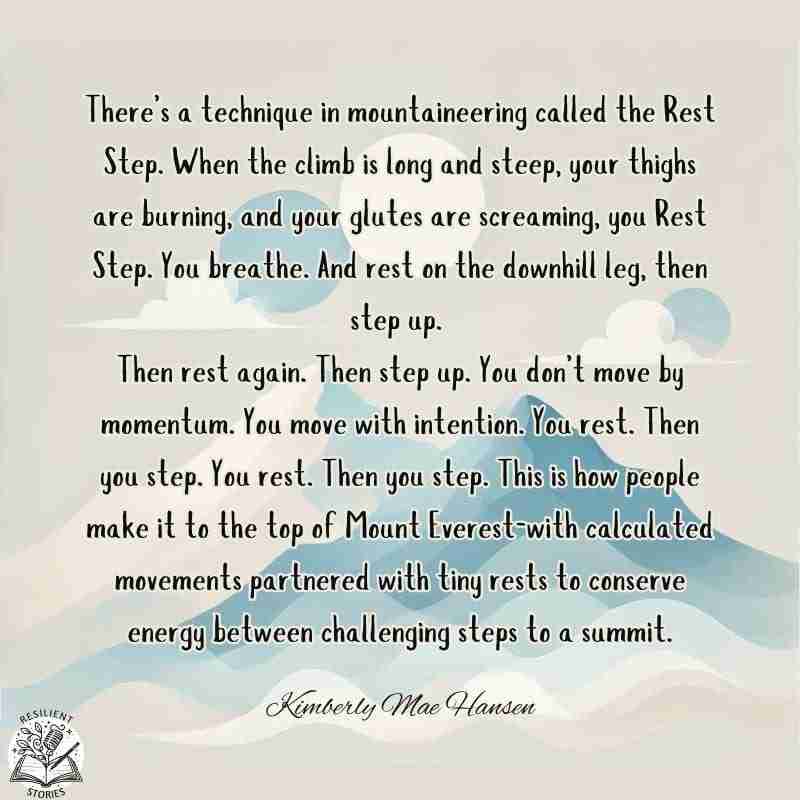
This is how I made it here. I rested between steps.
A New Beginning: Finding Happiness, Confidence, and Feeling Alive
Growth and change take time and energy. Healing trauma while also managing day-to-day life is not for the weak-spirited. It can feel unbearably hard. But I am telling you… The most beautiful views are at the end of the toughest climbs.
As a survivor of domestic violence, remember that you are not alone. There are resources and services available to provide support and help you through the healing process. It’s important to accept that the pain and suffering you endured are not your fault.
Stand tall and seek support from friends, family, and other survivors. Seek therapy and safe people. Educate yourself. Find and use all the free resources in your community if you need them. Just keep going.
Don’t let anyone talk you out of pressing charges against your abuser. You have the strength to press charges against your abuser if you choose, and this is one of many steps you can take to reclaim your life.
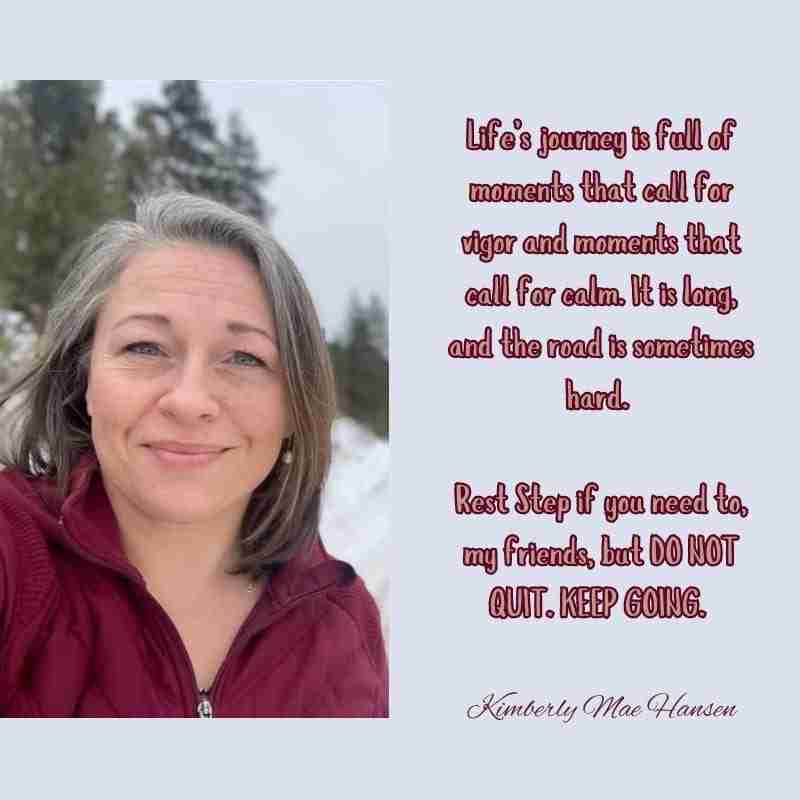
Life’s journey is full of moments that call for vigor and moments that call for calm. It is long, and the road is sometimes hard. Rest Step if you need to, my friends, but DO NOT QUIT. KEEP GOING. Then come back here and show me pictures of all the sunsets you saw at the summits!
Leave a comment if this author’s story moved you, and let them know!
















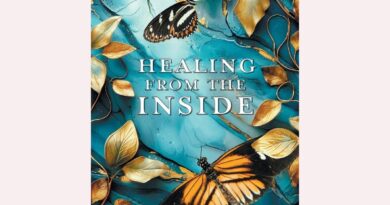












This blog beautifully shares the powerful journey of a domestic violence survivor. It’s inspiring and full of hope, showing the strength and resilience needed to overcome such hardships. Truly uplifting.
Thank you for taking the time to read her story and leave such a kind comment! Please take a moment and subscribe to our monthly newsletter.
I can’t imagine what you’ve been through as I have no reference point to abuse. In your story, I see your progress to a healthy relationship.
Thanks for publishing this!